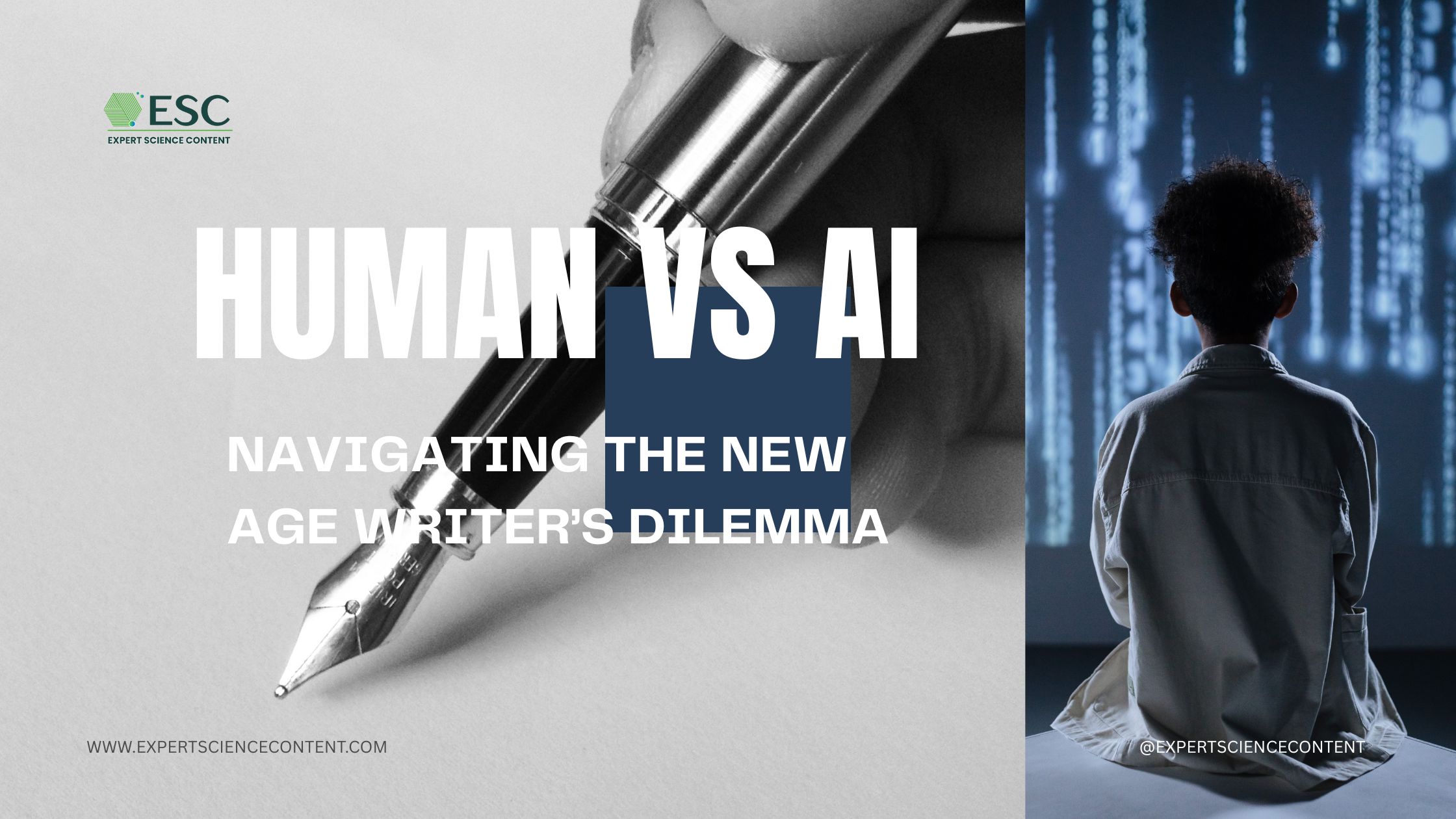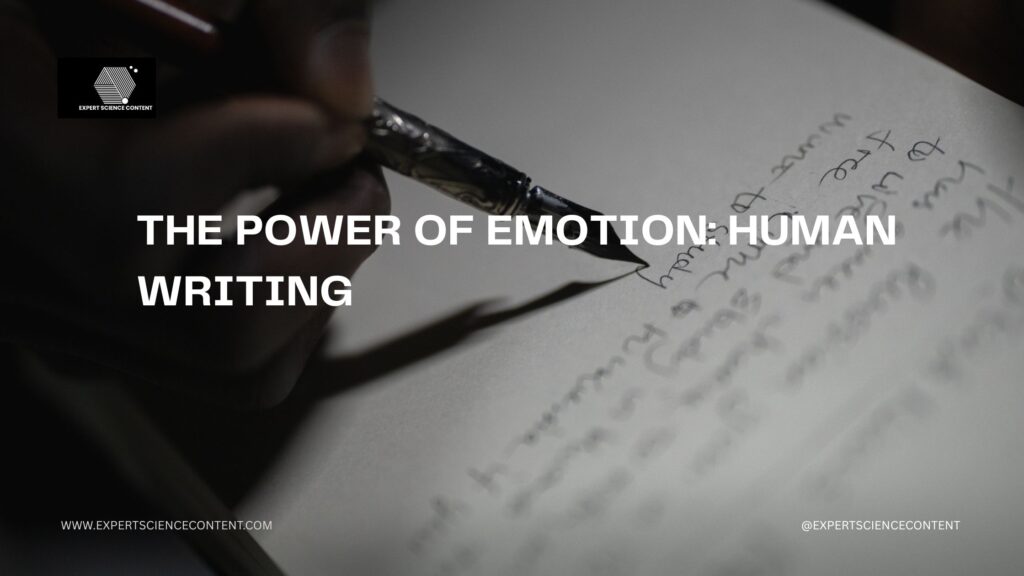- Published By: Dr. Anindita Talukdar
- Published On: September 18, 2025
- 7 Minutes to read
Human vs AI : Navigating the New Age Writer’s Dilemma
 Well, here’s a conundrum I didn’t see coming!
Well, here’s a conundrum I didn’t see coming!
Have you read something so visceral, so true, sometimes it felt like you were there at that moment and the writer connected with the core of who you are? And then you read something that is perfectly refined and structured, yet you feel no interest, no connection as if it lacks that human heartbeat!
That’s where the debate begins. In the tug-of-war between human vs AI writing, we’re not only balancing efficiency with artistry but grappling with the very essence of what it means to write and to read.
How does it feel when your writing is labeled “AI writing”? Why AI for writing isn’t always appropriate for your brand or assignment. So let’s begin with the new age dilemma. Shall we?
Human vs AI Writer: The Struggle Is Real
Let me be honest – I’m not as scared of AI content writing as many of us are.
Why?
Because I accept the reality, it is a new transformative technology, especially in today’s fast-paced world. That’s where most people assume AI can do their jobs just as effectively as they can, right? Because content is needed everywhere – students need an assignment finished instantly, researchers want to publish their research paper in a month’s time (not always possible!), and businesses aim to reach 10K followers on social media in just four weeks. That might be a tough pill to swallow for some, but I’ll say it anyway!
However, what they tend to forget is the connection, depth, and quality over quantity that actual writers have. Let’s be frank about the good things too. There have been many big companies in the last few years like Amazon’s Kindle Direct Publishing (KDP) that now ask authors if any part of their content or cover was generated by AI content writing tools produced by Google, Microsoft, etc. Isn’t it a good thing? The first major concern at this crossroads is authenticity and originality.
Drop a comment below—whether you agree or disagree, I’d love to hear your thoughts.
Creativity or Consistency? Breaking Down the Human vs AI Writing Challenge
AI trends are already reshaping the way we access and grasp the information. The latest trends in AI are combining with generative AI, and governments are improving the precision in information and capability of searching huge datasets. Agencies can free the value of their data and make it more accessible by investing in automated metadata tools, semantic search, and advanced document transcription.
By leveraging Google Cloud’s advanced machine learning (ML) and artificial intelligence (AI) capabilities to handle difficult challenges across diverse domains, from bioinformatics to material science to human performance optimization. Embracing the power of new AI trend and cloud computing to boost its mission of generating and transforming advanced technologies in air, space, and cyberspace forces.
If we talk about AI in aviation, one of the great examples is the Air force research laboratory, which is the center for scientific research and development for the U.S. Air Force and Space Force. And they are embracing the transformative power of AI and cloud computing to accelerate their development and transition in advancing technologies related to air, space, and cyberspace forces.

The Power Of Emotion: Human writing
Doesn’t ‘human writing’ sound a bit too technical? That’s what AI is doing to writers these days, making us compare writers to machines. So instead of saying ‘human writing’, I am just going to stick with ‘writers’. So writers write and express from their live experience. These are not just words on a page, there are emotions, memories, fear and scars. Whether it’s a love letter, an essay, manuscript, a journal entry at midnight, a blog, or a thesis, writing is a vulnerable act. No algorithm can recreate that emotion on that content piece. AI can create a very polished blog post for your client with all the facts and information in it but it’s the writer who can give that little bit of quirky thought or insight that connects with the audience.
I am a scientific writer, and based on my 15 years of writing experience, I can say that when I write a scientific journal article for a client, I certainly use their data but I always incorporate insights from my own research experience in the conclusion. This helps clarify the results and strengthen the overall message. That kind of contribution only comes with experience.
Humans are unpredictable. The metaphors, humour, perspectives we bring to table, all that are uniquely ours.
While content-creation using AI for writing is constantly improving, human vs AI content writing experience for emotional connection will remain a myth. Human writers have skills AI cannot replicate yet.
Human Skills AI Cannot (Yet) Replicate
Creativity & Empathy: We sometimes simply tell a story, write some humor, execute a metaphor – and we always, always apply empathy whenever appropriate. AI writing can imitate structure (sometimes) and tone but not empathy. You need feelings for that.
Adaptation & Authenticity: Changes tone, nuanced voice, human-inspired errors, active responsiveness to feedback comes with the atmosphere, feelings and human touch. These are significant ingredients to build trust, authority and real experience.

Why We At ExpertScienceContent Stands Out
Success depends on more than just talent or price. It is about likability, tone, and of course, personality. For example, ending your emails with a chirpy ‘Warm Regards’ always beats the drab, corporate ‘Best Regards’ or ‘Kind Regards’.
At ExpertScienceContent (ESC), we sometimes use AI writing tools for fact checking, gap analysis, drafting, and finding research outcomes to create an unforgettable content piece. We use tools to support, not to replace our creativity.
Read our blog: “Dementia: A Growing Health Problem” or “The Silent Battle Between Overthinking and Happiness” without using any AI writing tools for research or fact checking.
What goes into these blogs:
- Brainstorming and fact checking were done using scientific journals from Elsevier (proper journal references are provided for those who want to read the full articles).
- The first and second drafts were created after completing research, reading generalized problems while offering future focused hope.
- And the content was written and edited with warmth, insights, empathy, humor, and practical solutions grounded in personal experience and human emotion.
The end product: A post that was well optimized, ranked on the first page of Google, and really resonated with the audience, readers found it connected and driving very good engagement. Sure, the keywords had some influence, but ESC received credibility, and positive feedback from their audience, we embraced writing that was credible and of high quality.
Human Vs AI Writers: Who Really Wins the Content Game?
Let’s get into the research findings done worldwide:
- Research findings by Ma et al. in 2023, shows that the readers could successfully identify the AI-generated abstracts with 76% accuracy and 75% precision, while detection tools like GPTZero and ZeroGPT were inconsistent in spotting AI-generated text.
- Study shows that many forms of AI weren’t able to deliver good narratives, making AI-generated content phenomenally different from human written content. This finding counters popular fear about AI replacing human writers. Even AI blog writer can not engage with the audience as a writer.
- Studies from Springer journal have shown very mixed results regarding tools like Turnitin and Originality.ai are helping but they are not near perfect in detecting academic AI.
- A multidimensional comparison study by Sardinha et al. in 2024, reveals that linguistic analysis reveals AI generated texts show clear differences across multiple dimensions, making human writing more coherent in narrativity and involvement.
- As to reader perceptions: it turns out that even when the text of two articles is the same, labelling a piece as “AI-writer” or “AI blog writer” shifts and lowers credibility, trustworthiness, and perceived intelligence.
The Writer’s Greatest Gift
I have read it somewhere, “Through our words we shape the lives of others and the world itself. No matter what this world demands, no matter how dark it gets, know that the writing gift you possess is more precious than ever.” And that resonates with me deeply.
Writing is not just a sector; it is a friend, a way to understand facts, a means of spreading knowledge, a tool for survival, and an instrument of the soul for all writers, including myself. No matter where AI takes us, the human voice remains timeless.
Key takeaways
In the balance of human vs AI, authenticity wins and collaboration can flourish.
AI content writing provides speed, consistency, and scalability; but lacks emotions and feelings.
Human writing offers emotional depth, element of surprise, and soul. Where is the sweet spot? Effective combination of AI tools with human insight, honored by transparency and reinforced by originality.
So keep writing, keep putting your soul on paper. Together, let’s create thoughtful content that makes a meaningful impact. That language of the soul? That’s where the real magic happens.
At ExpertScienceContent, we specialize in creating engaging, high-quality blogs designed to meet your specific goals and reach the right audience. Visit our website www.expertsciencecontent.com to explore our services or get in touch to bring your ideas to life.
References:
- Research Publication: https://www.sciencedirect.com/science/article/abs/pii/S2666799123000436?utm_source=chatgpt.com
- Research Publication: https://www.sciencedirect.com/science/article/abs/pii/S2666799123000436?utm_source=chatgpt.com

Dr. Anindita Talukdar
The creative behind ESC sharing smart actionable tips and insights to level up writing and research skill.
Join ESC
Get our newsletter
Want to know more? Lets talk

Your article helped me a lot, is there any more related content? Thanks!
Glad you liked the blog! Keep reading — we will be coming up with a few unique posts about technologies.